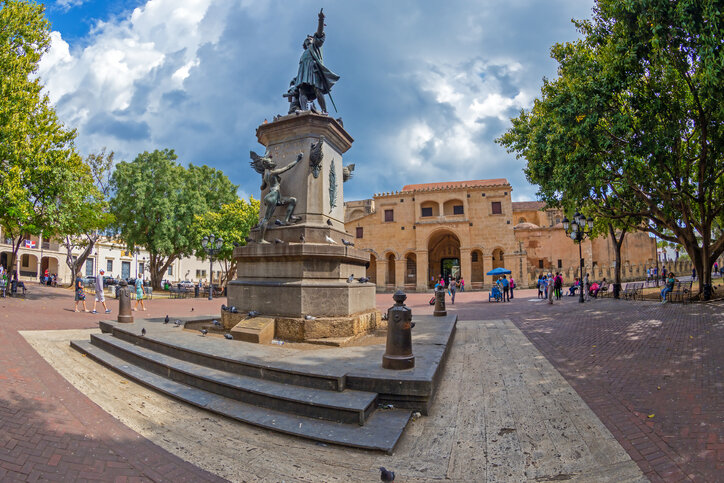Conversations about critical aspects of history are crucial in the classroom to form students with a complete and mature cultural identity.
Every October 12, the Day of the Race in Mexico (celebrated as Columbus Day in the United States), opens an ever-present conversation since historical revisionism led us to reevaluate how we remember the discovery and colonization of America. The main question that opens the debate is, should we continue to celebrate this anniversary?
New perspectives and historical revisions have brought to the center of the conversation the complicated legacy of the Europeans who discovered and conquered the new world. The first accounts depicted historical figures such as Christopher Columbus and Hernan Cortes as heroes and explorers who advanced history and made invaluable contributions to cartography, trade, and the formation of the American continent. However, those accounts left out the experiences of those who paid a huge price during the colonization of America, the indigenous races.
Simply the title “Discovery of America” implies many things, as if the continent and its inhabitants did not exist until the European powers “discovered” them or that it was an innocuous process without violence when the first event after the discovery was a gruesome, warring campaign of conquest. Perhaps calling it the “Invasion of America” would be more appropriate, but doing so carries a series of severe epistemic, philosophical, and cultural risks. How would we remember history then – as a lost war and not the historical beginning of the continent as we know it? What cultural identity would we have? Maya? Tlaxcala? Yaquis? We would understand Mexico differently, perhaps not even as a country, because we were not one before the arrival of the Spaniards and the subsequent liberation of independence. What reparations would we think should be granted to this cultural identity that denounces the discovery of America as an invasion? How would this situation impact the current geopolitical landscape and international relations with Europe? If you think these questions are a headache, there is a more complicated one: how would we understand the concept and cultural consequences of miscegenation? The total resignification of a historical event can have very sharp edges when it is a product of radical thinking, even within a context of good intentions and the search for justice.
In 2019, Mexican President Andrés Manuel López Obrador gave us a glimpse of what a Mexican government that manages relations with Spain looks like through the perspective of invasion rather than discovery. The President requested from the King of Spain and Pope Francis a letter of apology for the abuses committed to the native peoples of Mexico during the conquest 500 years ago. The Spanish government firmly rejected the contents of López Obrador’s letter and replied as follows:
“The arrival, 500 years ago, of the Spaniards to the current Mexican lands cannot be judged in the light of contemporary considerations. Our fraternal peoples have always been able to read our shared past without anger and with a constructive perspective, as free peoples with a common heritage and extraordinary projection.”
Spain also reiterated its readiness to collaborate with Mexico to build an appropriate framework that magnifies their friendship and cooperation to face future challenges. This year, Pope Fransico, the Vatican’s head of state, issued a letter of apology. This message of recognition and vindication took more than two years to produce. Although the process with the Vatican State was slow but favorable, the Spanish response undoubtedly opened a complicated digression. All of this exchange is an excellent example of how a historical perspective without memory of the oppressed can be incomplete and dangerous, but also a vision that uses history just as a tool of retribution or accountability.
The writer Leopoldo Mendívil offers a revealing and critical point of view about history in the first chapter of the book México a tres bandas (Mexico Decoded), written in collaboration with colleagues Pedro J. Fernández and Juan Miguel Zunzunegui. Mendívil speaks of two sides that approach the history of Mexico in opposite ways: the anti-Spanish, who detest Cortés and everything that came with the conquest, and the anti-Aztecs, who abhor this pre-Hispanic empire for its tribute system and affinity for human sacrifices. Both opinions are reductionist and overlook significant aspects of the hows and whys of pre-Hispanic Mexico and New Spain, for example, the fact that the conquest was fulfilled by the original peoples themselves. According to the Encyclopedia Britannica, during the Battle of Tenochtitlan, Cortés’ group barely exceeded 500, while his Amerindian allies numbered more than 200,000.
“Every nation existing today is the result of many conquerors in the past.” In his short but insightful quote, Mendívil advocates an analytical perspective of history that does not simplify the collective past to a matter of “heroes and villains.” Recognizing the role of indigenous Americans in the conquest of Mexico need not erase the atrocities committed by Spanish explorers, soldiers, and evangelists. Understanding that Mexican culture is the basis of national identity and is worthy of celebration, like that of all other countries in America (Latino or not), is not at odds with recognizing that the circumstances in which these cultures were born were not the epitome of respect for human rights. Indeed, when countries were created and established by military powers, what conquest could be free of crimes against humanity?
So, where does this extensive history lesson fit into the question of whether it is right to signify important historical dates like Columbus Day? This problem can be resolved in the classroom. If we talk about teaching history, it is necessary to teach it as a tool of social learning, the repository of collective memory, the understanding of the circumstances that constitute the present, whether good or bad, not as the basis of a cult of events and characters of the past. We can both celebrate and commemorate a date such as this. Celebrate the legacy of the culture of the native peoples, commemorate the tragedy of the injustices on which the colonies were erected in America – perhaps we have the space to do both things. However, we cannot fail to reflect on how complex and multidimensional historical events of this nature are.
The conversations in the classroom about history, as the recounting people’s experiences and international events that support interest agendas, some still in force, is crucial for creating a historical consciousness capable of seeing the greys – not blindly celebrating events linked to e
normous human costs. At the same time, these conversations should acknowledge the processes that gave rise to the positive aspects of the cultures and identities we have today.
How do you talk about the history underlying Columbus Day in the classroom? Do you open a conversation about the complexity of the events that formed the continent? Do you focus on the celebration part? Let us know in the comments.
Translation by Daniel Wetta.
Disclaimer: This is an Op-ed article. The viewpoints expressed in this article are the author’s own and do not necessarily reflect the opinions, viewpoints, and official policies of Tecnológico de Monterrey.
This article from Observatory of the Institute for the Future of Education may be shared under the terms of the license CC BY-NC-SA 4.0 
)
)


)